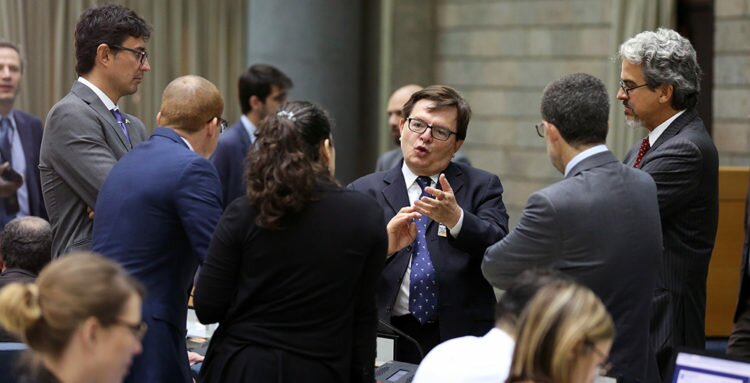Call for Papers: Recognizing Principles, Rights, and Duties

Summary
- In 2022, States will adopt a Political Declaration on the environment in accordance with UN General Assembly resolution 73/333. This 2022 Declaration comes in the context of the commemoration of the 50th anniversary of the 1972 Stockholm Conference and the subsequent creation of the UN Environment Programme.
- The Pathway to the 2022 Declaration is a blog by jurists for diplomats. Its purpose is to provide decision-makers with actionable legal advice in the run-up to the adoption of the 2022 Declaration on the environment.
- Contributors already include eminent jurists such as David R. Boyd, Dan Esty, Makane Mbengue, Nilüfer Oral, Nicholas Robinson, and Margaret Young.
- A first call for papers is launched to highlight the importance of principles, rights, and duties in international environmental law. Contributions take the form of short articles (1000-2000 words).
- To be on par with the diplomatic agenda, it would be preferable for contributions to be submitted prior to September 2, 2021. Nevertheless, articles submitted afterwards will still be welcome.
Introduction
In the past, two major declarations, the 1972 Stockholm Declaration on the Human Environment and the 1992 Rio Declaration on Environment and Development, have made a substantial contribution to the development of principles. With Stockholm+50 and UNEP@50 scheduled for next year, and the expectation that a new 2022 Declaration will be adopted, the editorial board is pleased to invite contributions on topics relating to principles, rights, and duties.
International environmental law is a field that is currently both abundant and fragmented. It has developed in a somewhat chaotic way, often in response to a disaster or an alarming scientific discovery. Its sources are multiple and sometimes even contradictory.
The increasing recognition of fundamental principles facilitates the coherence of international environmental law. These principles form its backbone. They provide the essential compass for finding one’s way through a vast body of texts, whose interpretation they clarify. As environmental litigation is developing rapidly, they can guide lawmakers and judges, whether nationally or internationally.
Rights and duties also play an increasingly important role in protecting the environment. They can reinforce environmental principles by clarifying how the environment has to be protected in the face of the ecological crisis.
The Blog
The Pathway to the 2022 Declaration platform is a blog by jurists for diplomats. It aims to provide diplomats negotiating the 2022 Declaration with actionable proposals in the form of short articles.
It is held under the patronage of former COP 21 President Laurent Fabius. ItsAdvisory Boardcomprises eminent jurists and experts such as Antonio Benjamin, Samantha Besson, David R. Boyd, Dan Esty, Makane Mbengue, Nilüfer Oral, Nicholas Robinson, Jeffrey Sachs, Jorge E. Viñuales, and Christina Voigt.
The Blog includes more than 20Partnersincluding the IUCN World Commission on Environmental Law (IUCN-WCEL), the International Council on Environmental Law (ICEL), the European Environmental Bureau (EEB), the Common Home of Humanity, and the Club des Juristes.
Topics:
- The Making of a Principle: how can a political declaration usher the development of new general principles of law?
- Pathways to impact: how may internationally recognized principles, rights, and duties shape the practice of domestic environmental and climate litigation?
- The 2022 Declaration: should it recognize new principles or/and enshrine existing ones? And which ones?
- From Regional to Global and vice versa: How can the recognition of new rights and principles by regional entities influence the making of international law? Conversely, how can principles defined at the regional level become universal?
- One increasingly important dimension is inter-generational equity. This long-recognized principle should be given more traction in actual judicial practice. What is the current state of the question? What avenues could be explored?
- Despite the importance of the science/policy interface in global environmental governance, principles have played a limited role in establishing clear parameters on the role of science as a compass for policy. What should be this role? How could it be fleshed out in legal practice?
- Animals and the Law: can the 2022 Declaration constitute an opportunity to recognize animal welfare?
- A Natural Decade: should the 2022 Declaration recognize or promote Rights of Nature?
This list is not exhaustive. Potential authors may propose other topics, provided they be directly linked to the preparation of the 2022 Declaration.
Content
- Actionable content: the content of the contributions is expected to be concrete, precise, and directly related to the preparation of the 2022 Declaration. Contributions should include actionable proposals pertaining to the Declaration, for example as to its content or its legal weight. Should it attempt to be a codification, progressive development or authentic interpretation effort? Pathway to the 2022 Declaration is an action-oriented blog.
- Intelligible style: publications are expected to be intelligible by decision-makers with a self-contained writing style that is sufficiently comprehensible by jurists and non-jurists alike.
- Key Proposals: in addition to the text of the article itself, submissions should be complemented by a short text summarizing the contribution’s key proposals in a brief abstract.
- Language: the language of publication is English.
Format
- Length: the length of a contribution should be between 1000 and 2000 words, inclusive of any references.
- Footnotes: footnotes may be used on the Blog. However, it is preferable that all references be included through hyperlinks. No distinction is made between endnotes and footnotes.
- Headings: if the contribution has subdivisions, they should be numbered 1.1 (then 1.1.1, 1.1.2, …), 1.2, etc. The introduction is not included in section numbering. Headings should be in bold.
- Citations: citations and references should be put in parentheses immediately after the propositions or quotations that they support.
- Hyperlinks: insert embedded hyperlinks to relevant supporting material and legal texts, including statutes, treaties, and cases. In Word, hyperlinks can be easily embedded by selecting text, right-clicking, and choosing the link option in the contextual menu.
Submission
- Author profile: if this is your first time contributing to Pathway to the 2022 Declaration, we will create your author profile. Please submit a short biography ranging from 100 to 200 words in the description section and, if applicable, a hyperlink to your professional web page and details of any LinkedIn or Twitter profile you may have. Please also attach a color photo of yourself in the form. You may additionally send any other photographs that are relevant to the content of your post.
- Keywords: a short list of keywords must also be included to ensure proper referencing of the article.
- Revisions: contributors can expect to be asked to revise their contributions and publication is never guaranteed.
Calendar:
- Deadline: To be on par with the diplomatic agenda, it would be preferable for contributions to be submitted prior to September 2, 2021. Nevertheless, articles submitted afterwards will still be welcome.
- Publication: articles will be published throughout the duration of the call for papers.
- Contact: for any further information, contact us on [email protected]
- How to submit: Posts should be submitted through the following form.

